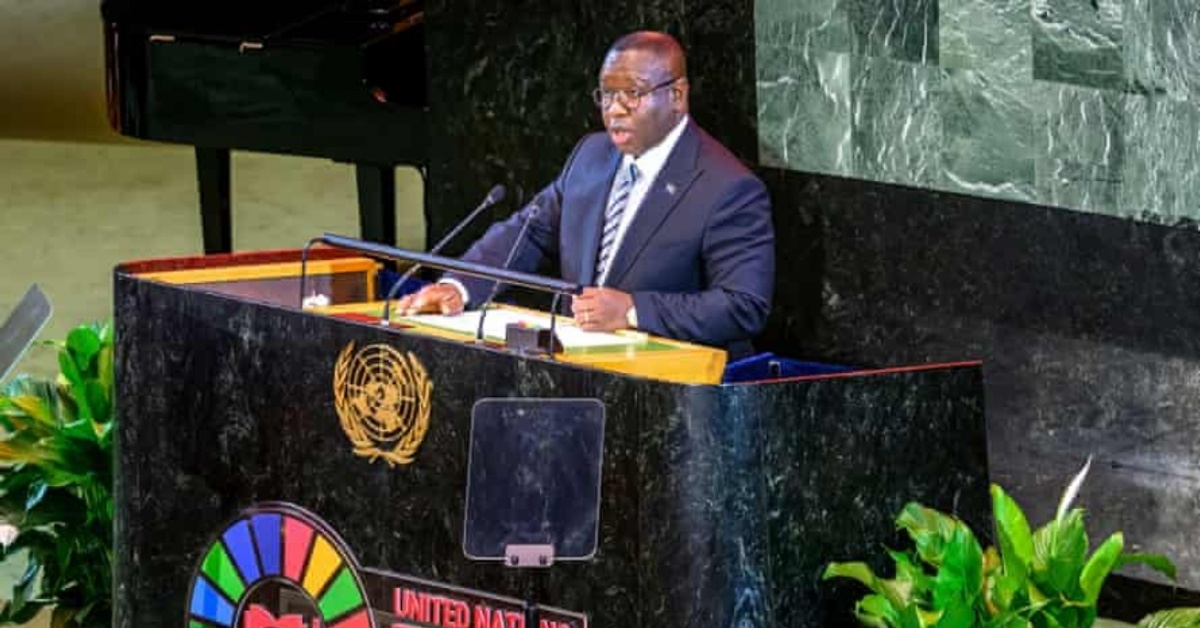Sierra Leone’s president has defended his decision to spend almost a quarter of the national budget on education, saying the country cannot develop unless all children go to school.
Speaking to the Guardian, Julius Maada Bio admitted that allocating 1.7tn leones (£80m) this year for its ambitious educational reform programme was a risk, but said: “We are throwing all our resources, all our energy into education. We cannot develop without improving education. I see it as an existential issue.
“I had to walk barefoot to school, with not even shoes on my feet. For me to come to this level of leadership, I think education has played a very important role.”
The Bio administration launched its “radical inclusion” programme in 2018, aiming to get millions more children into school by offering free, quality education to all youngsters, particularly those from poor and marginalised groups.
The government allocated 22% of this year’s budget to education, which represents one of the largest-percentage funding commitments in the world and double the percentage allocation in 2016. Additional money is being sourced from donors.
Girls’ education is a central component of the programme. More female teachers are to be recruited and trained, while pregnant schoolgirls are being encouraged to stay in class. Until 2020, pregnant schoolgirls were banned from continuing their education.
The policy has so far seen more than 1 million more children in class and higher completion rates.
However, the challenges of improving education in Sierra Leone are huge. The country has some of the world’s worst education metrics: fewer than half of the country’s 8 million citizens are literate.
The country’s 11-year civil war in the 1990s, the Ebola outbreak in 2014 and the Covid pandemic have set back the country’s development by decades.
The majority of the funding is being used to improve the quality of education by paying and training thousands more teachers. According to Joseph Kamara, from the Sierra Leone Teachers’ Union, approximately 20% of the 37,000 teachers on the government payroll do not turn up for work regularly. In some rural areas, people without qualifications will teach.
Teacher-training institutions are now required to verify a person’s qualifications before they can be hired. The government has also introduced a “quality benchmark” test to make sure teachers are proficient in maths, English and ICT.
Five charities are trialling different pedagogies across 325 government schools to research the best teaching methods.
Alberta Demby, the principal of St Joseph’s secondary school in the capital, Freetown, said the number of pupils at her school doubled in 2018 when free education was introduced. They had to build a new classroom block to accommodate more children, including six girls who are blind.
No new mothers have been admitted to Denby’s school since the programme started, however. “Parents are unhappy” about girls returning, said Demby. Sierra Leone lifted its ban on pregnant schoolgirls and young mothers attending class in March 2020 on the orders of the Economic Community of West African States court.
Fatima Fullah, 19, who attends Rolal senior secondary school in Port Loko, has stayed in class while pregnant.
“Many girls, when they know they are pregnant, they will not come to school because they feel ashamed,” said Fullah, who is due to give birth in four months. “But I decided to come and continue.”
Bio, who hopes to be re-elected next year, admits his radical approach is daring at a time when millions of Sierra Leoneans are feeling the pinch of the cost of living crisis.
In August, 21 protesters and six police officers were killed in Freetown during riots over the tough economic climate that were the biggest the country has seen since the end of the civil war. Opposition figures argue the government should allocate more resources to help immediate suffering rather than investing in education, which could take years to yield results.
It’s definitely a risk for a politician. But as much as I am a politician, I’m more of a development person,” said Bio.
“Girls are beginning to perform [better]. And this is all because of our radical inclusion policy, which makes sure girls are not left behind. Women are part of this; they have been kept at the back for a very long time. I have been vindicated in the past couple of years.” This year, the two top-performing pupils in the country were girls.
“We were once the Athens of west Africa,” said the president. “They used to say that, because of the quality of education provided. Sierra Leone is home to one of the first western institutions, Fourah Bay College. It collapsed in the 1990s, but we are trying to rebuild our education facilities to exceed expectations. It is a revolution.”











